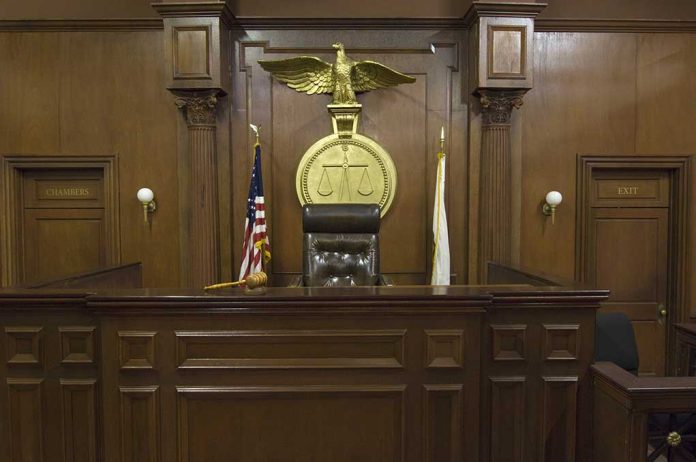
A man accused of attempting to assassinate former President Donald Trump has requested the judge overseeing his case to step down, raising questions about judicial impartiality in high-profile political cases.
At a Glance
- Ryan Routh, accused of plotting to assassinate Trump, requests Judge Aileen Cannon’s recusal
- Defense argues Cannon’s past rulings and Trump’s praise create doubts about impartiality
- Routh was arrested after being spotted with a rifle near Trump on a golf course
- The case highlights concerns about judicial fairness in politically charged environments
Assassination Attempt and Legal Proceedings
Ryan Routh stands accused of positioning himself with a rifle behind a chain-linked fence at one of Donald Trump’s golf courses, allegedly intending to wait for a clear shot at the former President. The incident, which took place in West Palm Beach, Florida, has now evolved into a complex legal case that touches on issues of judicial impartiality and political influence.
Routh has pleaded not guilty to charges including attempted assassination and firearm possession as a felon. He is currently being held without bond as the case progresses through the legal system. The gravity of the charges and the high-profile nature of the alleged target have thrust this case into the national spotlight, drawing attention to every aspect of the proceedings.
Suspect In Trump Assassination Attempt Wants Judge To Recuse
Ryan Wesley Routh's attorneys argue that Cannon could appear to be biased. pic.twitter.com/2gK1Ubkr7m
— The Epoch Times (@EpochTimes) October 18, 2024
Request for Judge Recusal
In a significant development, Routh’s defense team has filed a motion requesting that U.S. District Judge Aileen Cannon recuse herself from the case. This move has raised eyebrows and sparked discussions about the interplay between legal fairness and political notoriety in high-profile cases.
The defense’s argument for recusal centers on several key points. They contend that Judge Cannon’s past rulings in Trump-related cases, coupled with Trump’s public praise for her, create a perception of potential bias. Additionally, they highlight the fact that Cannon was appointed by Trump during his presidency, further complicating the optics of the case.
Judge Cannon asked to recuse herself from case involving alleged Trump assassination attempt due to potential bias. https://t.co/7nHDdCG7rC
— 94.9 TNT (@949TNT) October 18, 2024
Implications for Judicial Integrity
The recusal request brings to the forefront concerns about maintaining the integrity of the judicial system in politically charged cases. Routh’s lawyers argue that the public perception of Trump’s cases being deliberately assigned to Cannon could potentially damage the court’s integrity. This argument touches on a broader debate about how the judicial system handles cases involving high-profile political figures.
It’s worth noting that judges typically do not recuse themselves based solely on the identity of the president who appointed them. However, Routh’s defense team argues that this case is unique due to Trump’s status as the alleged victim. This distinction adds another layer of complexity to an already intricate legal situation.
Previous Rulings and Criticisms
Judge Cannon’s involvement in previous Trump-related cases has come under scrutiny. She previously handled a case involving Trump’s demand for special supervision over records seized from Mar-a-Lago and dismissed a related criminal case against the former president. These past rulings have led to criticism and appeals, with some decisions being overturned by higher courts.
The defense’s motion also points to Trump’s public praise for Cannon and speculation about her potential judicial promotion if Trump were to win the presidency again. These factors, they argue, further complicate the issue of impartiality in this case.
Next Steps and Implications
As of now, federal prosecutors have not stated their position on the recusal request. The decision on whether Judge Cannon will step down from the case remains to be seen. Regardless of the outcome, this situation highlights the challenges of maintaining public confidence in the judicial system when dealing with cases involving prominent political figures.
The case continues to evolve, with each development drawing attention to the delicate balance between ensuring a fair trial and navigating the complexities of cases with significant political implications. As the legal proceedings unfold, they will likely continue to spark discussions about judicial impartiality and the impact of political influence on the American justice system.
Sources:
- Man accused in Trump assassination attempt asks Judge Aileen Cannon to recuse herself
- Alleged Gunman Seeks Judge Cannon’s Recusal in Trump Assassination Case
- Trump assassination suspect asks Judge Aileen Cannon to recuse herself from the case
- mAlleged Would-Be Assassin Wants Trump-Appointed Judge off Case














